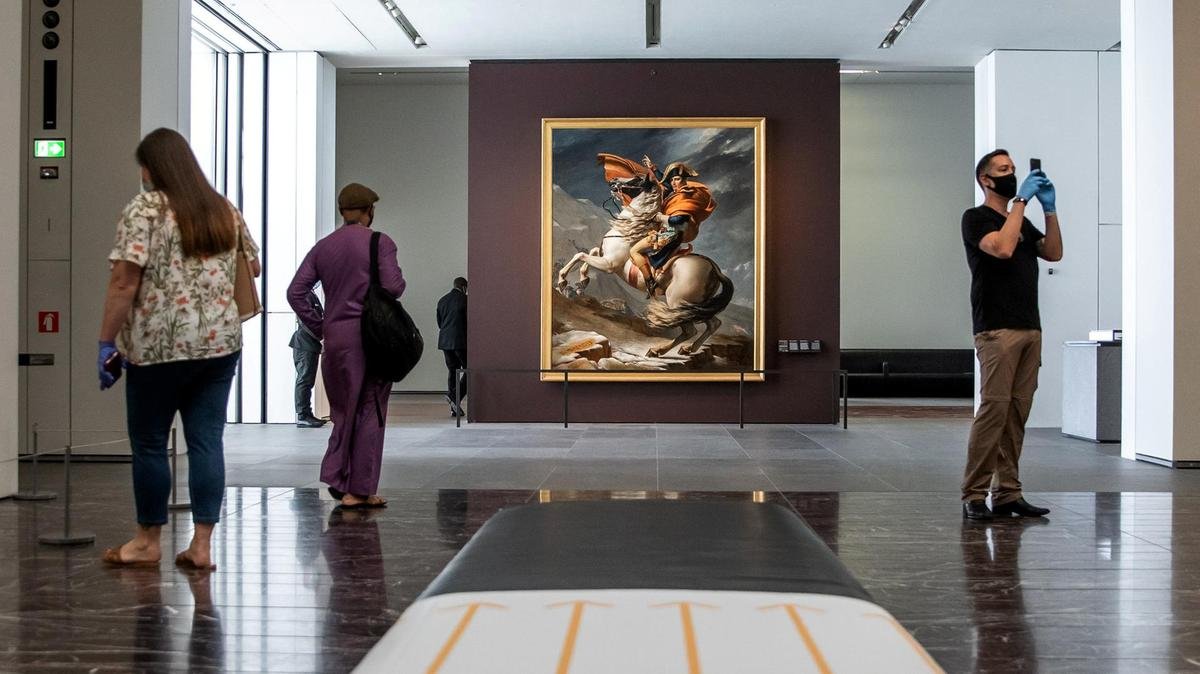Reframing Museums symposium: what role do cultural institutions play in the pandemic?

Written by Alexandra Chaves, and published originally by The National News, November 16, 2020.
This year has been a defining one for the arts – not least because of the pandemic and the economic fallout caused by shuttered spaces and cancelled events, but also from the cultural reckoning, particularly in the US, that followed George Floyd's death in May.
Can today’s museums navigate these changes, or will they lose their relevance while struggling to adjust?
This question was addressed on the opening day of Reframing Museums, an online symposium held by Louvre Abu Dhabi and New York University (NYU) Abu Dhabi, on Monday, November 16.
Part of the symposium’s aim is to explore the impact of the pandemic, the evolving role of museums and how institutions can bring to light narratives around repressed histories.
In his opening keynote speech, Mohamed Al Mubarak, chairman of the Department of Culture and Tourism – Abu Dhabi said: "This year has reanimated the profound role that culture plays in connecting societies, building on the commonalities between countries, rather than what separates us. It is only through collaboration and standing together in solidarity that we will identify the successful models for the future."
In 2020, museums particularly have had to tackle long-standing issues of colonialism, racism and sexism within their institutions and collections, all the while undergoing job cuts as Covid-19 continued to take its toll on their finances.
The symposium’s first round table "From acquisition to storytelling: what does the future hold for museum collections?" delved into one of the biggest concerns for museums today: how it acquires and displays its collections in light of the coronavirus pandemic and seismic cultural shifts.
Michael Govan, chief executive and Wallis Annenberg, director of the Los Angeles County Museum of Art (Lacma), pointed out the effects of social justice movements on institutions. “The calls to rethink museums have come very strongly, very broadly, and particularly, generationally,” Govan said.
“The Black Lives Matter movement has touched museums very deeply because art museums like ours that are history museums, we really are at the intersection of colonialist thinking. We do embed… structural racism as discussed in the United States,” he said, noting the criticism that museum collections have often had an Eurocentric point of view.
One way to turn this around for Lacma, he says, is to bring in younger curators on the team as a way to “tear down” and “rebuild” the way that the museum operates.
For Mikhail Piotrovsky, director of the The State Hermitage Museum in Russia, a collection of works remains the foundation for museums. “There are no museums without collections,” he said. The focus should be “how we can make these collections speak better”.
Piotrovsky referred to the role of museums as a “bridge” during these tumultuous times. “[Museums] make the bridges,” he said, “Bridges – between museums, between countries, between nations that are now falling apart.” This means creating dialogues between East and West, as shown in a recent exhibition featuring the work of a Chinese artist.
He also called the museum a “medicine” that can “help overcome the hysteria of the pandemic”. The State Hermitage Museum has since reopened and implemented social distancing guides in its space, as well as exhibited works that reflect on the current state of the world.
Sharjah Art Foundation’s (SAF) president and director Sheikha Hoor Al Qasimi highlighted the need for accessibility when it comes to artworks and resources. “Collections end up being in storage most of the time because there isn’t enough exhibition space, so the idea was for [SAF] to have a building dedicated to the collection near the University City in Sharjah so it’s more accessible to the students and everybody living in that neighbourhood,” she said.
Al Qasimi also pointed out the importance of discussing repatriations of looted artefacts and the listening of marginalised voices. “It’s important to look at histories of collections and museums from the point of view of the objects exhibited ... A lot of these works are objects of ritual and mean a lot of the community and they are looted items,” she said. The foundation does not face the same issues as historical museums in this regard, as its collection is comprised of mostly contemporary art."
The speakers also discussed how museums’ digital strategies have been reshaped by Covid-19. “Priorities have been redrawn ... and accelerated,” said Souraya Noujaim, Louvre Abu Dhabi’s scientific, curatorial and collections management director. “Notably, the digital aspects, the collection online, and how to create special narratives to the public in their homes.”
Noujaim added that the pandemic has reformatted Louvre Abu Dhabi’s “narrative for the future”, making them more multifaceted. She later added that an object can tell “many stories, depending on the angle you approach it. In Louvre Abu Dhabi, our artworks take their meaning with – and by the dialogue – with the other artworks. This is where we’re opening a new chapter in the history of the museums.”
On its first day, Reframing Museums received more than 1,000 registrations. As it continues until Wednesday, November 18, it will bring together more than 60 speakers from The Metropolitan Museum of Art in New York, Sursock Museum in Beirut, Samdani Art Foundation in Dhaka, the UK's Tate and Musee de Orsay, Paris.